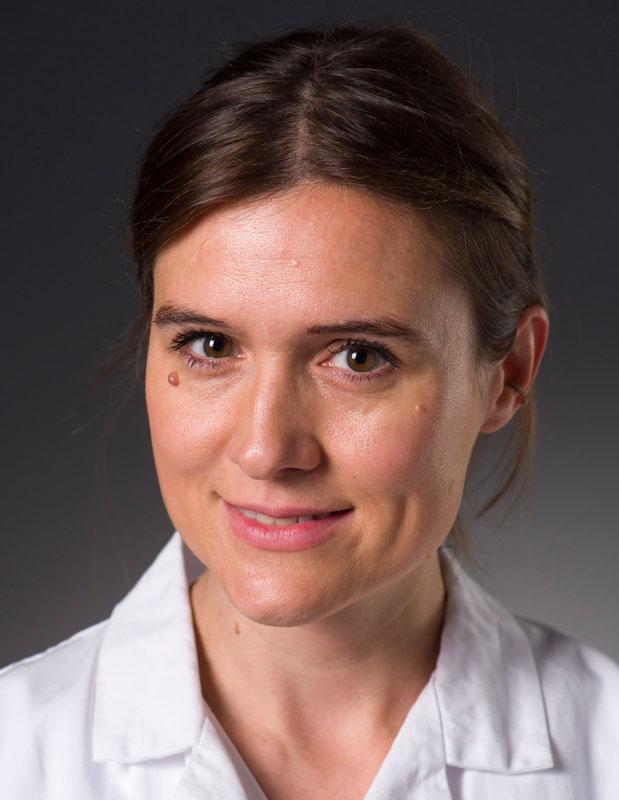
Katharina Bischof
- Consultant / Postdoc; MD, PhD
- +47 22 78 17 52
![]() Room: K04:061
Room: K04:061
![]()
Short bio
After graduation from Medical University Vienna, Austria, Dr. Bischof underwent residency training in Obstetrics and Gynecology in Vienna and Bergen. In 2014, she enrolled the postgraduate PhD program at the Centre for Cancer Biomarkers at University of Bergen.
Her research background covers translational research in ovarian and endometrial cancer as well as preclinical model development. In 2019, she joined the department of Gynecologic Oncology at the Norwegian Radium Hospital where she is working as a consultant under ESGO certified training.
Besides her clinical activity, she is engaged in clinical studies and committed to biomedical research. She is a member of ENYGO, ESGO, NSGO, Norwegian Medical Association and Oesterreichische Aerztekammer.
Publications 2024
Patient-derived acellular ascites fluid affects drug responses in ovarian cancer cell lines through the activation of key signalling pathways
Mol Oncol, 19 (1), 81-98
DOI 10.1002/1878-0261.13726, PubMed 39245677
Expression of PRAME in high-grade serous carcinoma is associated with higher residual disease volume and Occludin expression
Pathol Res Pract, 266, 155787
DOI 10.1016/j.prp.2024.155787, PubMed 39709875
Evolutionary mode and timing of dissemination of high-grade serous carcinomas
JCI Insight, 9 (3)
DOI 10.1172/jci.insight.170423, PubMed 38175731
Publications 2023
Occludin is overexpressed in tubo-ovarian high-grade serous carcinoma compared to mesothelioma and is a marker of tumor progression and chemoresistance
Clin Exp Metastasis, 41 (1), 69-76
DOI 10.1007/s10585-023-10251-5, PubMed 38141113
Publications 2020
Cross-Cancer Genome-Wide Association Study of Endometrial Cancer and Epithelial Ovarian Cancer Identifies Genetic Risk Regions Associated with Risk of Both Cancers
Cancer Epidemiol Biomarkers Prev, 30 (1), 217-228
DOI 10.1158/1055-9965.EPI-20-0739, PubMed 33144283
CD24-targeted fluorescence imaging in patient-derived xenograft models of high-grade serous ovarian carcinoma
EBioMedicine, 56, 102782
DOI 10.1016/j.ebiom.2020.102782, PubMed 32454401
Publications 2019
Influence of p53 Isoform Expression on Survival in High-Grade Serous Ovarian Cancers
Sci Rep, 9 (1), 5244
DOI 10.1038/s41598-019-41706-z, PubMed 30918304
Functional Analysis and Fine Mapping of the 9p22.2 Ovarian Cancer Susceptibility Locus
Cancer Res., 79 (3), 467-481
DOI 10.1158/0008-5472.CAN-17-3864
Publications 2018
High expression of the p53 isoform γ is associated with reduced progression-free survival in uterine serous carcinoma
BMC Cancer, 18 (1), 684
DOI 10.1186/s12885-018-4591-3, PubMed 29940909
Publications 2016
Assessing the genetic architecture of epithelial ovarian cancer histological subtypes
Hum Genet, 135 (7), 741-56
DOI 10.1007/s00439-016-1663-9, PubMed 27075448
The HDACi Panobinostat Shows Growth Inhibition Both In Vitro and in a Bioluminescent Orthotopic Surgical Xenograft Model of Ovarian Cancer
PLoS One, 11 (6), e0158208
DOI 10.1371/journal.pone.0158208, PubMed 27352023
Association of vitamin D levels and risk of ovarian cancer: a Mendelian randomization study
Int J Epidemiol, 45 (5), 1619-1630
DOI 10.1093/ije/dyw207, PubMed 27594614
Publications 2015
Shared genetics underlying epidemiological association between endometriosis and ovarian cancer
Hum Mol Genet, 24 (20), 5955-64
DOI 10.1093/hmg/ddv306, PubMed 26231222
